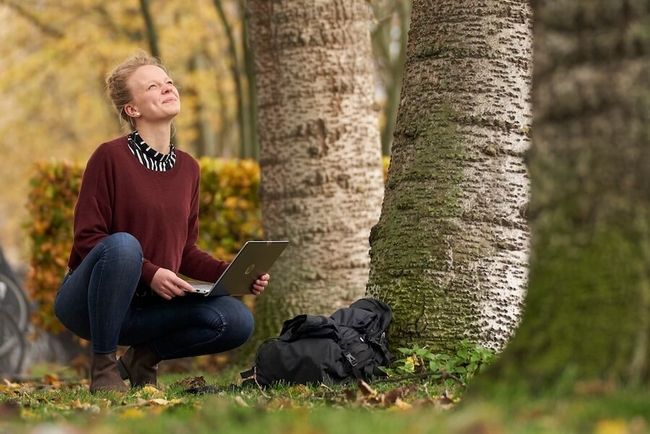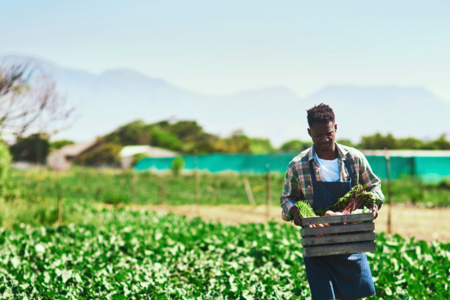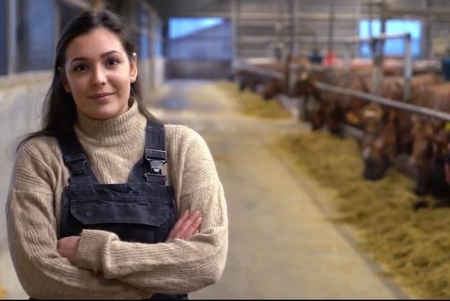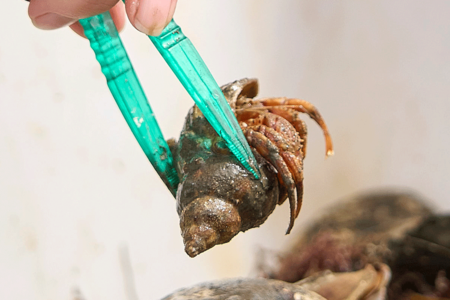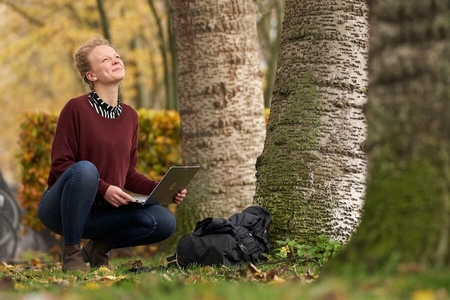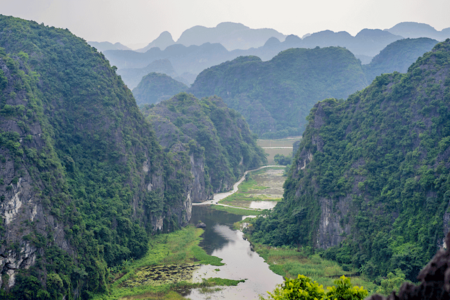About the programme
Nature Management is about management and sustainable development of nature and landscapes – based on knowledge of biology, ecology, human needs, and legislation. You will be qualified to work within administration, management, and planning in municipalities, private companies, NGO's, ministries, and agencies all over the world.
The programme is offered in English.
Who studies this programme?
The programme attracts students with a large variety of backgrounds including environmental science, biology, or geography, geology, landscape architects, urban landscape- and forest engineers. The students often care deeply about sustainability and nature conservation, and they are often motivated by practical problem-solving and long-term thinking and planning in a world of complex and sometimes contradictory interests.Why is this programme relevant?
Sustainable nature management is essential to climate adaptation, biodiversity conservation and nature restoration. This can only be done by a multidisciplinary approach provided by this program. Graduates work on solutions that balance ecological health with societal needs. The skills are relevant across sectors and borders.Considering studying at UCPH this September?
Apply by 15 January if you are an applicant from outside the EU/EEA/Switzerland. Apply by 1 March if you are from the EUAdmission and application
To apply for admission to this master's degree programme, you must have completed a qualifying bachelor’s degree or a similar Danish or international degree programme which is assessed to be relevant. Apply for admission via the application portal.
Below, you can read more about admission requirements and which documents to upload in the application portal.
Academic admission requirements
Here you'll find the different academic requirements depending on which qualifying degree you hold.
You meet all academic requirements if you hold one of the degrees listed below. Learn about when and how to apply. Note, however, that you still need to document that you meet the programme's language requirements.
Bachelor's degree in
- Natural Resources, Geography and Geoinformatics, Biology, Landscape Architecture from University of Copenhagen
Professional Bachelor’s degree in
- Forest and Landscape Engineering (skov- og landskabsingeniør) from University of Copenhagen
- Urban Landscape Engineering from Zealand Institute of Business and Technology
If you have a Bachelor’s degree other than those listed above, you must submit additional documentation along with your application so we can evaluate whether or not you meet the admission requirements. Learn about when and how to apply.
If you have a Bachelor’s degree, Professional Bachelor's degree or equivalent from Danish or international universities you are qualified for admission if your programme includes the following:
- Ecology – at least 7.5 ECTS credits.
Ecology: Scientific competences within and knowledge of the structure and function of ecosystems. Relevant academic areas including e.g. plant physiology, population and community ecology, systems ecology, soil science, and biogeochemistry. - Species knowledge – at least 7.5 ECTS credits.
Species knowledge: Fundamental knowledge and competences within botany or zoology.
We may also admit applicants who, after an individual academic assessment, are deemed to possess educational qualifications equivalent to those required above.
Qualifying degree and other courses/projects
When we assess whether you meet the admission requirements for the Master's degree program, Danish legislation only allows us to assess your Bachelor's degree. Consequently, you cannot study supplementary courses between Bachelor's and Master's degree programs in order to meet the admission requirements.
If you have passed courses/projects before you complete the qualifying Bachelor's degree, these can be included in the assessment, even though they are not part of the Bachelor's degree program.
- It applies to courses/projects you have taken as single subjects and courses/projects you have taken as part of another study program.
- A maximum of 30 ECTS credits of these courses/projects may be included.
Language requirements
You are required to document that you fulfil the language requirement English B, unless you have a legal right of admission to the programme you are applying for.
Please note that you must have the documentation ready by the application deadline.
Application deadlines
Study start in September
1 March at 23:59
Application deadline for Danish applicants and applicants from within the EU, EEA and Switzerland.
Open for applications from 16 January. You will receive a reply by 10 June.
15 January at 23:59
Application deadline for applicants from outside the EU, EEA and Switzerland.
Open for applications from 15 November. You will receive a reply by 1 May.
How to apply
Choose the category below that fits you and read more about how to apply for admission. You will also find information about application deadlines and documentation on the websites.
Citizen in Denmark, EU EEA or Switzerland
Bachelor’s degree from Denmark
International bachelor’s degree
Citizen in a country outside EU, EEA or Switzerland
Bachelor’s degree from Denmark
International bachelor’s degree
Prioritisation of applicants
If the number of qualified applicants to the programme exceeds the number of places available, applicants will be prioritised according to the following criteria:
- Total number of ECTS credits in relevant courses in ecology and species knowledge
- Grade-point average achieved in qualifying degree
Limitation on second degrees
If you have already completed a Master's degree, please check out the rules concerning a second degree.
| Admission statistics Nature Management 2025 | |
|---|---|
| Admitted (of which have start in February) | 39 (0) |
| Admission distribution (legal right/other) | 3% / 97% |
| Applicants | 137 |
| Age average | 27 |
| Nationality (dk/international) | 67% / 33% |
Programme structure
Compulsory thematic courses will give you the basic understanding of the core academic subject areas in the programme.
In addition, you choose courses from a pool of restricted elective courses, thereby strengthening your specific profile.
Finally, it is possible to personalise your degree and to create a profile that suits your personal academic interests by choosing between many elective courses: These could include biodiversity and conservation, ecology, nature perception, environmental economics, environmental chemistry, conflict management, etc.
The teaching varies between lectures, exercises, excursions, and project work. The thematic course and most of the elective and restricted elective courses include field work and excursions.
The MSc programme is concluded with a scientific project, the thesis, which takes 4 or 7 months and entitles graduates to the title Master of Science (MSc).
Do a Project in Practice or Study Abroad
You can use some of your elective courses to do a Project in Practice in collaboration with a company or an organisation. You can also choose to study abroad as part of your programme. Read more here:
Programme Overview
The programme can be structured in two different ways, depending on the size of your thesis:
Course table, Thesis 30 ECTS
Compulsory courses: 15 ECTS
Restricted elective courses: 45 ECTS
Elective courses: 30 ECTS
Master's thesis: 30 ECTS
One block each year equals nine weeks of study and 15 ECTS. The table is primarily for guidance and may be subject to revision.
Year 1
| Block 1 | Block 2 | Block 3 | Block 4 |
|---|---|---|---|
| Thematic course I: Ecology and Management of Nature and Semi-Nature Areas | Restricted elective course | Restricted elective course | Restricted elective course |
| Restricted elective course | Restricted elective course |
Year 2
| Block 1 | Block 2 | Block 3 | Block 4 |
|---|---|---|---|
| Elective course | Elective course | Thesis | |
| Elective course | Elective course | ||
Course table, Thesis 45 ECTS
Compulsory courses: 15 ECTS
Restricted elective courses: 45 ECTS
Elective courses: 15 ECTS
Master's thesis: 45 ECTS
One block each year equals nine weeks of study and 15 ECTS. The table is primarily for guidance and may be subject to revision.
Year 1
| Block 1 | Block 2 | Block 3 | Block 4 |
|---|---|---|---|
| Thematic course I: Ecology and Management of Nature and Semi-Nature Areas | Restricted elective course | Restricted elective course | Restricted elective course |
| Restricted elective course | Restricted elective course |
Year 2
| Block 1 | Block 2 | Block 3 | Block 4 |
|---|---|---|---|
| Elective course | Thesis | ||
| Elective course | |||
Restricted Elective Courses
Choose your restricted elective courses from the lists below. Click on each course for a detailed description.
You are required to choose one of the following courses:
- Thematic Course II: Rural Landscape – Management and Planning (15 ECTS)
- Thematic Course IIB: Rural Landscape – Management and Planning (15 ECTS)
Furthermore, you must choose one of the following courses:
- Environmental & Planning Law – Nature & Water (bachelor level; course language: Danish)
- EU Law – Environment, Agriculture and Food (bachelor level)
- Global Environmental Governance
Your remaining courses must be chosen from the list below:
- Aerial and Near-Field Remote Sensing
- Applied Ecosystem Ecology
- Applied Statistics: From Data to Results
- Biodiversity in Managed Forests
- Biodiversity in Urban Nature
- Climate Change Mechanisms and Tipping Points
- Conflict Management
- Conservation Biology
- Ecosystem Services from Forests and Nature
- Ethics, Environment and Society
- Feltkursus i naturforvaltning
- Geographical Informations Systems (GIS)
- International Nature Conservation
- Introduction to Data Science (IDS)
- Land Use and Environmental Modelling
- Landscape and Restoration Ecology
- Macro Ecology and Community Ecology
- Motivation and Pro-Environmental Behaviour - Managing Change
- Nature Perception – Theories and Methods for Investigation
- People, Nature and Recreation
- Planlægning i det åbne land
- Rural Landscapes: Transformation and Governance
- Strategic Planning for Urban Nature
- Tropical Forest Restoration
Programme Curriculum
If you are more interested in the academic content, regulations, and examination requirements, you should consult the curriculum, which serves as the legal foundation for the programme.
There is both a curriculum specific to each degree programme and a general curriculum that applies across the faculty.
Please note that curricula are often revised annually. Any new versions will be published no later than during the spring semester.
Video: Sophia and Ann Elizabeth talk about the study programme in Nature Management
Career opportunities
Upon completion of the master’s programme, you will obtain the title Master of Science in Nature Management.
The main objective of the programme is to provide you with a deep understanding of how and why human beings interfere with the environment and what consequences this interference might have.
This involves knowledge about biological diversity, ecosystems, and cultural landscapes. You will also learn about the legal framework of nature management and the rationale behind national, European, and global initiatives to conserve and manage nature and biodiversity.
The programme includes three general pillars:
- Biology, ecology and the environment – you will get a sound basic knowledge of the most common nature types and important processes in the ecosystem as well as of ecosystem services e.g., water, biodiversity, carbon storage, and recreational options.
- Management and regulation – you learn about management and legislation within nature and the environment, providing you with the foundation for plans and projects in for example relation to regulation.
- The human being as a player – you gain insight in impact of human beings on landscape development and an understanding of the interests of various groups, including how conflicts can be avoided and resolved.
In the course of the study programme, you will also learn how to integrate the three areas and prepare sustainable overall solutions.
Employment
The programme offers many career opportunities, and you can work within several different areas.
You may find employment within public administration, for instance in municipalities, ministries, or government agencies in Denmark, in the EU, or internationally. In these public bodies, you may work with nature and planning at an overall strategic level or at a more operational level, for example as a project manager in a specific ecological restoration project.
Other opportunities include working as a consultant in private companies, consultancy firms, or NGOs. Furthermore, you may find work in international and supranational organisations with political and management-related tasks.
Finally, you may start a research and development career in the university community or other research institutions.
Student life
High quality education in English, a flexible study structure, excellent facilities, an international study environment, attractive and green campus areas, and the opportunity to experience life in Copenhagen, the cool capital of Denmark. These are some of the qualities about studying at Faculty of Science (SCIENCE) at University of Copenhagen that you can expect.
Throughout the year, various social activities are arranged for all SCIENCE students and for international students specifically. These activities include:
- Introduction Days for new students
- A welcome programme for international students
- International dinners, courses, and lectures
- Sports activities such as fun runs or bicycle races
- Career workshops
Students live in residence halls outside campus or share a flat in the Copenhagen area. You will find that the relatively small size of Copenhagen makes it easy to get around, even by bike.
Where Will I be Studying?
The Nature Management programme is primarily based at Frederiksberg Campus.
The Frederiksberg Campus hosts part of the Faculty of Science and the veterinary area of Faculty of Health and Medical Sciences. It is located a few kilometres west of the city centre in beautiful green surroundings, and Frederiksberg is a popular residential area. The Gardens, which are part of the Frederiksberg Campus, are popular with both students and locals. In the summer months, you can drop by Café Væksthuset, which is located in an old greenhouse, for a cup of freshly brewed coffee and a delicious sandwich.
At campus, you can join student clubs and societies of a more or less academic nature. Regardless of whether you are interested in choral singing, sports, the theatre or a special academic subject, there is a club for you.
Here you will find some useful links and videos about student life and housing in Copenhagen, and the welcome programme for international students at Faculty of Science.
- Information about living in Copenhagen – plus practical information on housing, civil registration number, residence permit and more
- General information on student life and studying at University of Copenhagen
- Housing Foundation Copenhagen is an independent entity which assists international students and researchers at University of Copenhagen in finding accommodation. Visit Housing Foundation Copenhagen here
Video: Study Science at University of Copenhagen
Meet Elizabeth and Alex who study at the University of Copenhagen in Denmark. See what it is like to live and study in Denmark.
Video: SCIENCE Welcome Programme
The SCIENCE Welcome Programme is a great way for international students to be introduced to the Faculty of Science at the University of Copenhagen.
Testimonials
Read interviews with former students from the Master of Science programme (MSc) in Nature Management:
After completing a BSc in Biology at Aarhus University, Peter Lyhne Højberg decided to do Nature Management in Copenhagen. “I would recommend Nature Management to others who, like me, are not fieldwork or laboratory types, but who like the societal dimension and an international perspective.”
Why did you decide to do a BSc in Biology?
I did languages at upper secondary school, and I actually started studying Arabic at Aarhus University. It was quite interesting at first, but I honestly didn’t know what I could use it for afterwards, so I lost interest and felt constrained.
So, I went to Alaska instead. I couldn’t afford to travel, so I found a family I could stay with via the WWOOF (World Wide Opportunities on Organic Farms) organisation. I worked on the farm in return for meals and accommodation. One day as I found myself in the magnificent Alaskan wilderness I thought: “I should study biology”. Because the natural landscape was fascinating.
I’ve always been interested in biology, but had been unable to take that path because I had specialised in languages. But when I returned from Alaska, I did the necessary supplementary courses in mathematics, chemistry and physics, and then applied to the Biology programme at Aarhus University.
But you went on to do Nature Management rather than more Biology. Why?
It was only during the BSc programme that I realised what area I wanted to work in. Studying otoliths in various fish species is just ‘not me’. It’s too detailed. What I found most interesting was the bigger picture.
I like working with ecology and the large systems of nature, so I worked out that I wanted to combine the natural and social sciences. I realised that if I was going to be an ambassador for and make decisions on behalf of nature, the economic and political aspects would be crucial. It’s interesting to have a different perspective that goes beyond just biology.
What does the Nature Management programme involve?
It focuses on what it takes to manage natural resources – i.e. knowledge about the processes that govern nature and the climate, and the laws and rules that define how we want nature to look. What made the degree programme attractive to me was the fact that I didn’t have to abandon biology, but just add courses in management and biodiversity to it.
Which jobs can you get as a graduate?
The programme aims to prepare us for employment with local authorities that are interested in conserving nature and nature restoration projects, and that want to find the best way to manage the remaining natural resources. It also targets project management jobs with consultancy firms such as COWI or Ramboll.
The Nature Management programme is international. This is one of the reasons why I chose it, because I would like to be able to work abroad and work with the bigger picture.
Has the programme given you an opportunity to go abroad?
Yes, I’ve just returned from a three-month stay in Tanzania. I chose to do a ‘Project in Practice’, whereby you have to find a project you can participate in and make sure it is relevant to the degree programme.
The project looked at the relationship between people and wild animals. I lived in a township just outside a national park in Tanzania. The residents grow bananas right up to the edge of the park. This leads to problems with monkeys, elephants and hippopotamuses that encroach into the fields. The local Maasai also have problems because the hyenas take their cattle. And finally, there are problems with poaching.
The project is headed by a small Tanzanian organisation that collects data. In the longer term, they want to teach the local population about the importance of having wild animals and protecting the environment.
I’m considering doing my thesis on poaching. The idea is to describe a future scenario, focusing on how to avoid poaching.
Mammals are on the rise again in many places, and we need to get better at protecting them. In the Nordic region, the wolf has returned, and this is leading to conflicts. In Sweden, for example, there have been problems following the re-introduction of the lynx, with people putting out poison to kill them. Perhaps we will see the same problems with the wolf in Denmark.
Would you recommend the programme to others?
I would recommend it to others who, like me, are not fieldwork or laboratory types, but who like the societal dimension and an international perspective.
In reality, I could probably have carried on doing Biology and chosen most of the courses I have done as electives. But the University of Copenhagen has this clearly defined programme called Nature Management, and that is a strength.
What kind of job do you want in the future?
I’d like to work as a consultant. For example, advising anyone who wants to do a nature restoration project – suggesting how it can be achieved and what impacts it will have on its surroundings. It could also be fun to be involved in international projects.
Since completing the degree programme, Peter has worked as a consultant with Ramboll and as a nature manager for the Municipality of Thisted and the Danish Environmental Protection Agency.
"I really like how international this programme is. And I find the professors really helpful and always available for discussions, so it’s been a very positive experience so far", says Mita Nagarkar from Michigan, USA.
Why did you choose Nature Management?
I have always been interested in nature. I used to go camping with my parents every summer, so it’s always been a part of my life. Even when I was little I used to study animals and plants.
I have a Bachelors degree in Environmental Studies from University of Michigan and I wanted to continue my studies in that direction. I felt a Masters in the same field, especially if it was international, would be relevant for my future opportunities.
But why exactly Nature Management?
Because I’m particularly interested in how we can manage parks and bring back green spaces into our daily lives. I want to be involved in sustaining and bringing back functioning ecosystems that work alongside our societies.
I had a one year break between my Bachelors degree and this programme. I did several internships to try out a couple of different career paths. One was field work and research for METLA, the Finnish Forest Research Institute forthree months. The other was a five months stay in Brussels, Belgium, where I learned about environmental policy.
Why did you choose University of Copenhagen?
I looked at several universities when planning to follow an international programme. I decided to come here, because the city had such a good environmental reputation and a great biking culture. Also it’s such an international place and the programme focuses on group work and field work. I knew I wanted that from my earlier education.
What’s going on in the programme so far?
In the first block we had a thematic course. Everybody in the programme had class together. We had weekly excursions where we went out in the field and afterwards we analysed what we found and made group presentations. Right now I have a restoration ecology course and a course in nature perception. It’s about how various stakeholders come together over environmental problems.
How do you find the programme?
I think it meets my expectations of what I’m looking for in a master’s programme. I really like how international this programme is – we are students from 17 countries. And I find the professors are extremely helpful and always available for discussions, so it’s been a very positive experience so far.
What’s your ambition?
I think it’s changed what career I see myself in. Now I see myself working for an international environmental organization or specifically in the field of restoration of ecology.
Would you recommend the programme?
Yes. I think Copenhagen is an amazing city to live in. Everybody has been very welcoming and the programme has been excellent. I’ve had the least amount of paperwork to be able to stay here in Denmark and it has been very easy to adjust to the culture here.
Any tips for future students?
Bring warm clothing. I came here in summertime and forgot to bring enough. And get a bike. You can go everywhere on a bike here - that’s one of my favourite aspects of life in Copenhagen.
Mita now works as a Senior Mitigation Specialist at Caltrans in California.
Contact student guidance
Questions about study choice and admission
Our student guidance are ready to assist you with answers to your questions about:
- application procedure and the digital application portal
- admission- and language requirements
- documentation
- study life
- career opportunities
- study choice or doubts
Did you not find what you were looking for?
You can find answers to questions most often asked by potential students in the FAQ. Read the FAQ
Questions about the digital application-portal?
Do you have questions about digital application? Check our user guide to the application portal.
In case of technical problems, please contact the IT-support by
- Mail: it-service@adm.ku.dk // Tel: +45 35 32 32 32
Location
- Frederiksberg Campus, Thorvaldsensvej 40, DK-1871 Frederiksberg.
